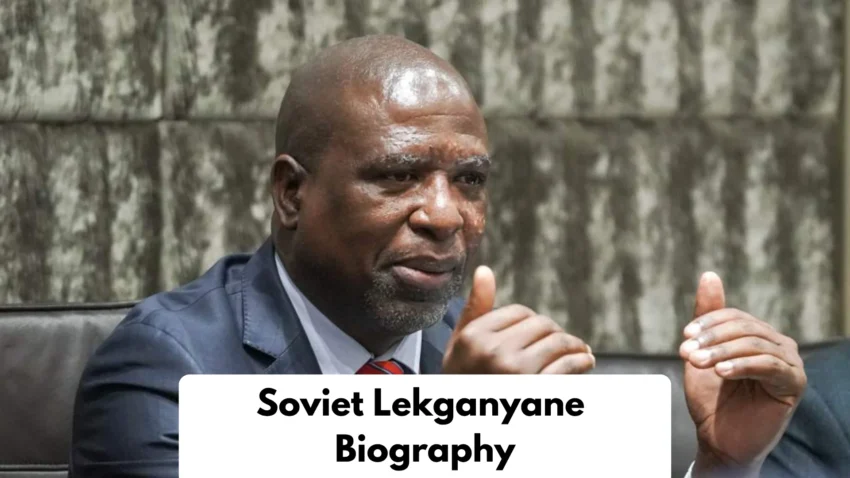Molapi Soviet Lekganyane (often called “Soviet Lekganyane”) is a prominent South African politician with roots in Limpopo province.
Born on 18 April 1974, he has been active over two decades in provincial and national politics, serving in various key roles and navigating factional politics, controversy, and influence.
Early Life & Education
- Soviet Lekganyane was born on 18 April 1974.
- His birth name is Molapi Soviet Lekganyane.
- Although public sources do not widely document his early schooling or family upbringing, by his adult life he acquired strong credentials and political involvement that propelled his career.
Entry into Political Life & Rise in Limpopo
Soviet Lekganyane began to gain prominence in the Limpopo provincial political scene through leadership within the South African Communist Party (SACP) and the African National Congress (ANC).
- Provincial Secretary, SACP (Limpopo): From August 2008 to March 2011, he held that post, making him a notable figure in provincial leftist circles.
- In 2011, for reasons tied to internal party dynamics, he resigned from the SACP post, citing disagreements with the national leadership regarding influence and contract awards. His resignation was publicly controversial.
Roles in the Limpopo Executive & Legislature
Soviet’s political career includes multiple stints in the Limpopo provincial government and legislature:
- MEC for Local Government & Housing (2009–2012): After the 2009 general election, then-Premier Cassel Mathale appointed him as Member of the Executive Council (MEC) for Local Government and Housing.
- During his time in that executive role, he was involved in controversies tied to party allegations of contract favoritism, which featured in his later dispute with the SACP.
- Legislature terms:
- From 2009 to 2012, he served in the Limpopo Provincial Legislature.
- Later, from 2014 to 2018, he returned to the legislature, even chairing its finance committee during that period.
ANC Provincial Secretary in Limpopo
A key turning point in his career was his role within the ANC provincial structure:
- In December 2011, Lekganyane was elected ANC Provincial Secretary (Limpopo) under Chairperson Cassel Mathale. To assume this role, he resigned his MEC position.
- However, factional disputes in the ANC led to the ANC national leadership disbanding the Limpopo Provincial Executive Committee in March 2013, effectively ending his first stint as provincial secretary.
- In June 2018, he was again elected Provincial Secretary, this time under Chairperson Stan Mathabatha, beating rival candidate Lehlogonolo Masoga.
- During that term, he called for anti-corruption drives, especially in response to the VBS Mutual Bank scandal and perceived misconduct in ANC ranks.
- However, allegations of misconduct followed him — in 2021, he was accused of sexual assault during a heated branch meeting; he denied the claims and countered with charges of property damage.
- By the June 2022 provincial conference, he stood for re-election but lost to Reuben Madadzhe, garnering 451 votes versus Madadzhe’s 714.
Transition to National Politics
- At the ANC’s 55th National Conference in December 2022, Lekganyane was elected to a five-year term on the ANC National Executive Committee (NEC). He ranked 17th out of 80 elected.
- In February 2023, at the NEC’s first meeting, he was appointed Deputy Chairperson of the ANC National Dispute Resolution Committee, and also joined other disciplinary and oversight bodies.
- In the 2024 general election, he appeared on the ANC’s national list and won a seat in the National Assembly, representing the party in Parliament.
- Since 14 June 2024, he serves as a Member of the National Assembly.
Influence, Reputation & Legacy
Soviet Lekganyane is often viewed in political commentary as a dexterous operator: someone capable of navigating factional divisions, bridging alliances, and sometimes drawing criticism for overreach or controversy.
He has been considered for a return to powerful provincial leadership roles: for instance, in 2015, there were speculations he might once again assume a leadership position in Limpopo ANC structures.
His political trajectory reflects the broader tensions within the ANC — between loyalty to national leadership, local power struggles, the influence of aligned party structures like the SACP, and the pressures of accountability in scandal-prone environments.
FAQs
Q1: What is Soviet Lekganyane’s full name and birthdate?
A1: His full name is Molapi Soviet Lekganyane, born on 18 April 1974.
Q2: Which major political positions has he held?
A2: Among others:
- Provincial Secretary, SACP Limpopo (2008–2011)
- MEC for Local Government & Housing (2009–2012)
- ANC Provincial Secretary, Limpopo (2011–2013; 2018–2022)
- Member of Limpopo Legislature (2009–2012; 2014–2018)
- Member of the ANC National Executive Committee (since 2022)
- Member of Parliament / National Assembly (since June 2024)
Q3: Why did he resign as SACP provincial secretary?
A3: Lekganyane claimed a breakdown in relations with the SACP national leadership over interference, factionalism, and contract pressure. The SACP denied his claims, calling them slander.
Q4: Has he been involved in controversies?
A4: Yes — notably, he was accused in 2021 of sexual assault (which he denied and countered). He also faced allegations of favoritism, internal party factionalism, and conflicts with party leadership.
Q5: Did he win re-election as Provincial Secretary in 2022?
A5: No. He lost to Reuben Madadzhe in June 2022 (451 votes vs. 714).
Q6: What is his role in national politics now?
A6: He is a Member of the National Assembly (since June 2024) and a member of the ANC National Executive Committee.
Conclusion
The life and career of Soviet Lekganyane demonstrate the complexities of South African provincial and national politics. Rising from provincial SACP leadership into high roles within the ANC, his journey has seen both triumphs and trials — from contested internal battles to ethical controversies.
Though he lost some provincial contests, his election to the ANC’s NEC and ascent into Parliament underscore his resilience and continued relevance. His career will continue to be closely watched, as he may yet redefine his legacy in South Africa’s evolving political landscape.
